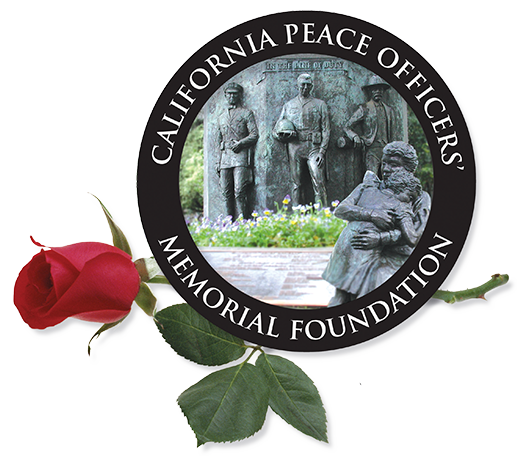Joey Little used to tell his colleagues at the police department that life can change in the blink of an eye. He’d say “Tell people today that you love them; you may not have the chance tomorrow.”
“It turned out to be almost prophetic,” said Matt Reynolds, one of Little’s closer friends on the force.
Little, the city’s first police officer to die of injuries sustained on duty, was buried with full honors on August 13, 1996 at the Forest Lawn Memorial Park in Cypress. The injuries occurred in an October 1989 car accident caused by a driver who ran a red light.
The massive brain damage Little suffered ended his life as he’d known it and took from his family and friends a man they described as dedicated, romantic, athletic, compassionate and fun.
Instead, Little and his family took on a long, loving, painful struggle to keep him in their lives. Early this past summer, the effort became too much.
“Enough was enough,” said his wife of 19 years, Diane Little, praised by her husband’s colleagues for her bravery and loyalty. “The pain was too much. He’d fought as long as he could. He decided it was time to let go.”
On July 28, in one of the periodic letters she sent friends to keep them abreast of her husband’s progress, Diane Little wrote: “Joey recently requested in writing that we love him enough to let him die… I asked that he write about this request with more than one person. His request was consistent and thus is being honored…”
Little said her husband quit the many medications he was taking to prevent infections. He asked to be baptized, was working with a hospice team, and was at peace, she wrote their friends.
On August 7, he died. He was 40.
Little served the Placentia Police Department from 1977 to 1989, first as a reserve officer, then patrol officer, field training officer, sergeant and finally detective. In 1989 he received the Distinguished Service Medal for writing an updated Field Training Officer Manual still used by the Placentia Police Department.
“I liked him right away,” said officer John Somoya, an old hand on the force by the time Little arrived. “He was young, energetic, exciting, Yet, he could be very serious when the time came.
Fellow officers tell a story about Little jumping in to help a paramedic free what they both believed to be a dead woman from a car threatening to burst into flames. She survived. And the time Little ran into a burning building to rescue a man who had gone back in to save a dog.
“He did what was right,” said Sgt. Rick Miller, another old friend. “There was never a question of that with Joey. He had a way of guiding other people to what was right too.”
His dedication wasn’t only to work. He loved deep-sea fishing with friends from the force or heading out to the Anza-Borrego desert to ride motorcycles. He had a huge backyard garden. He was a horseman and an accomplished photographer.
Diane Little said she received five phone calls over the years informing her that her husband was injured and hospitalized. Nevertheless, she found it easy to be a cop’s wife, she said.
“He wasn’t a hot-shot cop or a redneck,” she said. “He was a thinker and a leader. And there was that much trust.”
On October 31, 1989, Sgt. Little was helping out a fellow officer and friend, Brian Hill, who was recuperating after being shot while on duty and had been assigned to light-duty. Little had been appointed “contact person” to assist Hill.
He soon earned the nickname of “Mother Joey” through his efforts of watching out for his welfare. He was taking Hill to the police station when a driver ran a red light and smashed into the driver’s side of the car.
Hill was relatively unscathed, but Little had numerous injuries, including crushed limbs and massive head injuries. The driver of the other car received a ticket for running the light.
After the accident Little needed a respirator. Two days later, his doctors told Diane to say good-bye. “I couldn’t” she said. “I told him, ‘If you’ll fight, I’ll fight and I’ll fight as long as you fight.’”
Little fought to relearn writing, and to remember how to speak He communicated via eye blinks and an eye-controlled computer: He lived with pain, but eventually he even managed to stand.
About a year ago, the family moved him to a hospital in Kansas where care was more individualized. His mental acuity continued to rise and fall. His health began to deteriorate, and he broke his leg in May. The pain he lived with increased and he finally asked his family to let him go.
The quality of his life had deteriorated beyond being bearable. He stopped fighting the infections that attacked him.
Breaking the news to friends, Diane Little wrote: “Joey’s strength and courage have continued to show through as he teaches me the true definition of ‘dying with dignity.’”
Joey Little’s Courage was matched by that of his wife, Miller said. “The true gold in this story is her perseverance, and how loyal she was to her husband through all that happened to them,” Miller said. “They were well suited. Both bullheaded in the best sense. There’s got to be a special place in heaven for people like her.”
Casie, 16, Keith, 13, and Kelly, 11, and their mother, however, say they are grateful for the time they were able to have with their father and husband.
A trust fund has been established at the Bank of Yorba Linda, 18206 Imperial Hwy. Yorba Linda, CA 92886. Attn: Judy Heffner. Checks should be made out to the Joey Little Trust Account.

